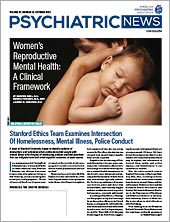Dyanavel XR Available for ADHD
Dyanavel XR (amphetamine) extended-release tablets are now available for treating attention-deficit/hyperactivity disorder (ADHD) in patients aged 6 years and older, Tris Pharma Inc. announced in August. The drug was approved by the Food and Drug Administration (FDA) in November 2021 based on data from a clinical trial in adults that found the extended-release tablets to be the bioequivalent of Dyanavel XR extended-release oral suspension.
The tablets are available in 5 mg, 10 mg, 15 mg, and 20 mg dosages. The 5 mg tablets are functionally scored and may be divided into equal halves of 2.5 mg. The recommended starting dosage is 2.5 or 5 mg once daily in the morning and may be increased in increments of 2.5 mg to 10 mg every four to seven days up to a maximum daily dose of 20 mg.
The label for Dyanavel XR extended-release tablets contains a boxed warning alerting prescribers that central nervous system stimulants, including Dyanavel XR, have a high potential for abuse and dependence. The warning also directs prescribers to assess the risk of abuse prior to prescribing and monitor patients for signs of abuse and dependence while on therapy. The prescribing information also notes that Dyanavel XR should not be substituted for other amphetamine products on a milligram-per-milligram basis because of different amphetamine salt compositions and differing pharmacokinetic profiles.
Esmethadone Fast Tracked for Major Depression
The FDA has granted fast track status to REL-1017 (esmethadone) as a monotherapy for the treatment of major depressive disorder (MDD), Relmada Therapeutics Inc. announced in August. The FDA fast track is a process designed to facilitate the development of medications that treat serious conditions and fill an unmet medical need and to expedite their review.
In a phase 2 trial, 62 patients with MDD were randomized to REL-1017 (25 mg or 50 mg) or placebo daily for seven days. The primary endpoint was an improvement in the Montgomery–Åsberg Depression Scale (MADRS) score at day 7.
MADRS scores improved on day 4 in patients who took either dose of REL-1017 compared with those who took placebo. The improvement continued through day 14, seven days after the patients stopped taking the medication. From baseline to day 7, MADRS scores decreased a mean of 16.8 points in patients who took 25 mg and 16.6 points in those who took 50 mg compared with 8.8 points in those who took placebo. There were no serious adverse events while the patients took the drug, and there were no symptoms of withdrawal after patients discontinued the drug.
The phase 3 RELIANCE-III trial is evaluating REL-1017 as a monotherapy, while the phase 3 RELIANCE-I and RELIANCE-II trials are evaluating the drug as an adjunctive therapy.
AD04 Promising for AUD in Patients with Certain Genetics
Adial Pharmaceuticals’ genetically targeted serotonin-3 receptor antagonist AD04 may help lower the number of days of heavy drinking in people with alcohol use disorder (AUD) who have certain polymorphisms in their serotonin transporter and receptor genes, the company announced in July.
In the ONWARD phase 3 trial, 302 adults with AUD were genetically screened and grouped according to how many drinks they drank on average a day: heavy drinkers who averaged fewer than 10 drinks a day or very heavy drinkers who averaged at least 10 drinks a day. Patients received either AD04 or placebo orally twice a day for 24 weeks.
At 24 weeks, the number of days of heavy drinking decreased significantly in heavy drinkers who took AD04 compared with those who took placebo. In the last month of the trial, heavy drinking decreased approximately 79% among heavy drinkers who took AD04. At the conclusion of the trial, patients in the heavy drinking group who took AD04 had a significant difference in the severity of their AUD diagnosis compared with those who took placebo.
However, when the results were analyzed for all patients in the study together, the reduction in heavy drinking days from baseline to 24 weeks did not differ significantly between those who took AD04 and those who took placebo. This result was influenced by a high response among very heavy drinkers who took placebo. ■
